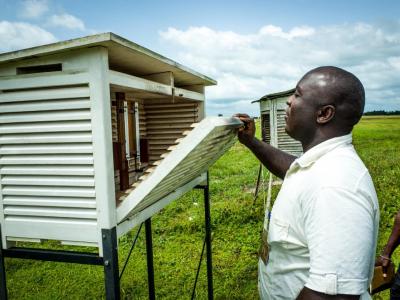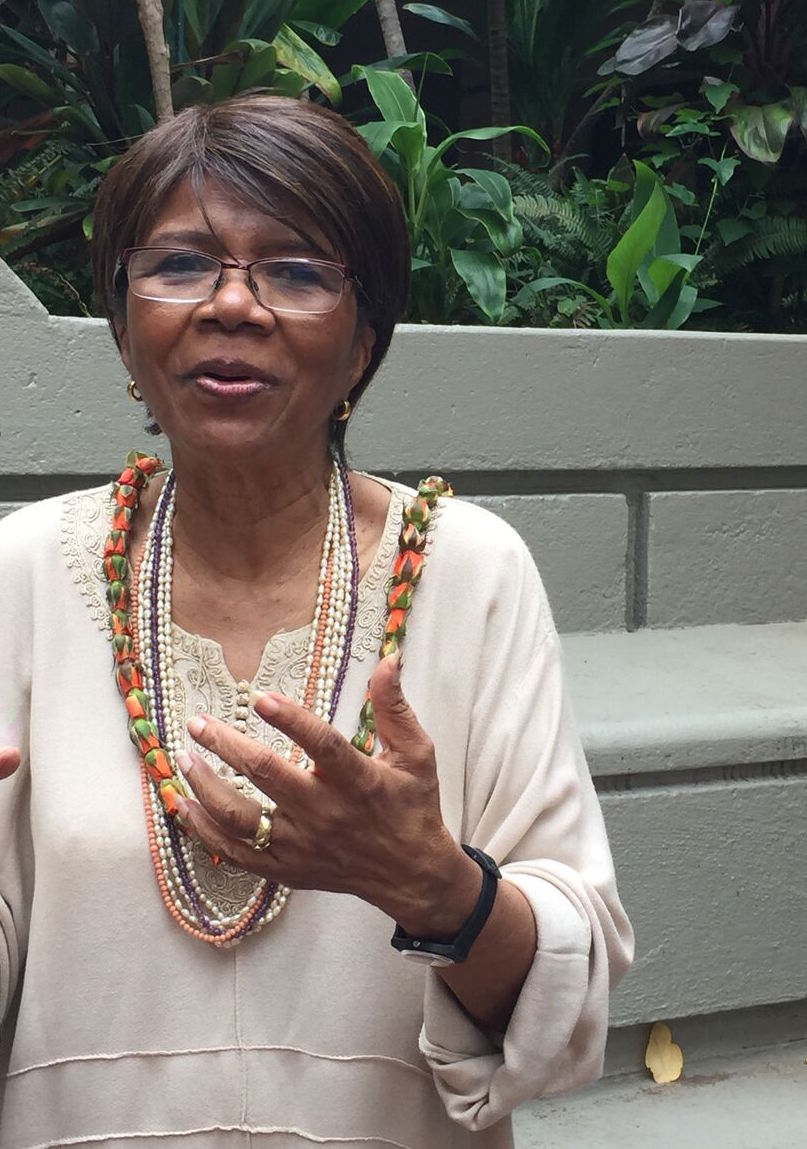Building effective climate governance in Liberia

UNDP connects with the Executive Director of Liberia’s Environmental Protection Agency to explore new steps in building climate resilient development
Climate change poses significant risks to Liberia in reaching its goals for sustainable development and climate action. Strong governance will be a key in building the enabling and transformative institutions necessary to protect the people of Liberia from sea-level rise and other climate impacts, propel development gains to reduce hunger and poverty so that no one is left behind, and protect peaceful climate-resilient economic and social development.
Madam Anyaa Vohiri is a climate hero from Liberia. Her work as the Executive Director of the Environmental Protection Agency provides unique insights into how Least Developed Countries can plan for climate change and build for the future.
In advance of the launch of Liberia’s new Green Climate Fund-financed project to advance the National Adaptation Plans (NAP) processes for medium-term investment planning in climate-sensitive sectors, UNDP caught up with Madam Vohiri to discuss the unique challenges and opportunities facing this nation.
UNDP: What risks does climate change pose to the people, economy and security of Liberia?
MV: Liberia faces significant risks as a result of climate change owing to the fact that there is a high level of dependence on climate-sensitive activities, such as rain-fed agriculture, which makes the country vulnerable to climate variability and change – higher temperatures, more extreme weather events such as heavy rains, and rising sea levels.
The impacts are felt on the population in terms of loss of livelihood, income and settlement. The economy is challenged due to a decline in productive capacity, especially in the agriculture sector. Huge infrastructure investments along the coast (seaports, hospitals, schools, hotels, etc) are also at a huge risk of being destroyed by sea erosion.
Classic examples of threats to our critical infrastructure are found at two of Liberia’s premier health facilities (JFK and Redemption hospitals), which are seriously threatened by sea erosion.
Involuntary migration due to coastal erosion, flooding and drought triggers disputes over land and other resources, which has security implications.
The agricultural sector, which accounts for about 70 percent of jobs and over 90 percent of total export earnings, is even more vulnerable to a changing climate that could lead to intensification of food insecurity and loss of revenue.
UNDP: Liberia is still recovering from a 12-year Civil War and the Ebola Epidemic (2014-2016) that destroyed 75 percent of educational infrastructure and 95 percent of health facilities. Why is the Government of Liberia prioritizing these plans for climate change adaptation or National Adaptation Plans (NAPs)?
MV: Liberia recognizes climate change adaptation as a priority because climate change presents a clear present and future threat to our most productive sectors. At the moment we are extremely vulnerable due to reliance on agriculture and natural resources, and our high level of poverty, low adaptive capacity, and poor infrastructure for water, health, sanitation, etc.
UNDP: How will Liberia’s plans for climate change adaptation contribute to the nation’s Nationally Determined Contributions through the Paris Agreement, global goals outlined through the 2030 Agenda for Sustainable Development, and other global accords such as the Sendai Frame work?
work?
MV: Liberia’s plans for climate change adaptation through the NAP and other initiatives will significantly support the planning and implementation frameworks of its Nationally Determined Contribution (NDC), Sustainable Development Goals and the Sendai Framework by safeguarding national assets, sectors and resources against the adverse impacts of climate change and disaster. It achieves this by promoting climate resilience in key sectors (agriculture, health, forestry, energy, waste and coastal areas), which will reduce disaster risks, promote sustainable agriculture, reduce poverty and hunger, and protect vulnerable infrastructure.
UNDP: How does climate change affect men and women differently in Liberia, and how will the Government of Liberia’s plans for climate change address these issues?
MV: In Liberia women tend to encounter the effects of climate change far more than their male counterparts. This is because they constitute the majority of the country’s poor and are more dependent for their livelihood on natural resources that are threatened by climate change. Additionally, women are faced with social, economic and political barriers that limit their ability to cope. In rural communities, women are especially vulnerable because they are highly dependent on local natural resources for their livelihood. Women are often the ones responsible to secure water, food and fuel for cooking and heating, and are thus susceptible to the greatest challenges.
Our approach to addressing the gender disparity of climate change impacts in the country is to mainstream gender in all of our adaptation plans and activities.
UNDP: Almost three out of four people in Liberia feed their families and ensure their livelihoods through agriculture. What steps is the Government of Liberia taking to build resilience in the agricultural sectors?
MV: Out of the 2008 National Adaptation Plan Programme of Action (NAPA), Liberia received support from the Global Environment Facility that led to the development of a project titled “Enhancing Resilience to Climate Change by Mainstreaming Adaptation Concerns into Agriculture Sector Development in Liberia”, which was implemented by the Ministry of Agriculture.
The project exposed farmers, including women, to adaptation innovations through farmers field schools, use of water management/water control practices for the lowlands, use of climate resistant crop varieties, integrated soil fertility management and integrated pest management.
UNDP: How will Liberia work to create employment and economic opportunities that provide increased resilience to changing climate scenarios?
MV: Job creation remains a priority for the Liberian government. With major commodity prices at an all-time low for the extractive industries, agriculture offers one of the greatest potential for job creation and economic growth, and the way forward is climate resilient agriculture. This increases productivity thus enhancing income generation, which in turn reduces poverty, improves food security and supports high levels of economic growth. Tourism on the other hand offers a lot of potential for job creation and economic growth given the country’s endowment in forest and biodiversity.
UNDP: There are a number of ongoing initiatives to improve climate resilience in Liberia. For example the Global Environment Facility Least Developed Countries Fund-financed Coastal Defense Project and Climate Information and Early Warning Systems project are working to protect your vulnerable coastline and improve the monitoring, analysis and distribution of early warnings and climate information. How will improved planning connect with initiatives like this?
MV: Improved planning through the National Adaptation Plans will promote coordination and synergies amongst the various interventions, and enhance the availability of capacity and knowledge for scaling up adaptation in the medium to long term.
Disaster risk reduction can promote investments in prevention and preparedness, which limits the exposure of the human population and vital economic assets to the threats posed by natural disasters such as storms, while improved monitoring provides early warnings that can support planning in agriculture, healthcare, transportation, etc., all of which are critical for improving the livelihood of the Liberian population
UNDP: What role will the private sector play in building climate resilience in Liberia?
MV: The private sector is weak in Liberia. However, in the last few years, the EPA has made significant effort in raising awareness in the private sector about the impacts of climate change with an effort to promote private sector involvement in reducing emission and promoting innovative adaptation practices. Currently, two of the major rubber producing companies in Liberia (Firestone and LAC) have deployed hydro-electric power generation plants to meet their energy needs and the communities that rely on them. This effort aligns with some of our Nationally Determined Contribution commitment and the EPA will continue to work with the private sector to identify ways in which they can build climate resilience in the areas where they operate.
Madam Anyaa Vohiri was appointed to the position of Executive Director of the Environmental Protection Agency in 2010. Under her leadership, the EPA has maintained its commitment and support for 10 multilateral environmental agreements including the UN Framework Convention on Climate Change (UNFCCC). Madam Vohiri was awarded with Liberia’s most prestigious corporate award: “Outstanding Public Leadership Award” at the Liberian CEO, Business and Leadership Awards in 2017. The EPA was also awarded with Liberia’s ”Best Regulatory Agency of the Year.”
This is an extended interview from the Medium Photo essay originally published on UNDP.